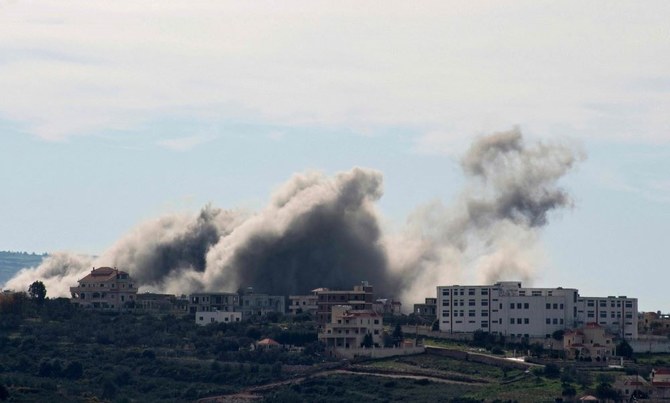BEIRUT: Israel intensified its attacks on southern Lebanon on Monday. A residential house in the border town of Maroun Al-Ras was targeted during a raid, resulting in the deaths of four individuals.
A security source said that the target was Hezbollah’s official in the town.
Israel increased its targeting of Hezbollah’s leaders in the field. A car near the Bint Jbeil Governmental Hospital was hit by an Israeli drone targeting Hezbollah official Mohammed Abd Al-Rasoul Alawiya. Although Alawiya managed to survive, there were casualties in the attack whose identities remained undisclosed.
Hezbollah mourned Mohammed Baqir Hassan Bassam from the town of Ainata and Ali Ahmed Muhanna from the town of Maroun Al-Ras.
Hezbollah typically discloses the identities of its killed members, but it never discloses the identities or number of its injured members.
An Israeli raid targeted a house owned by the Ataya family in the town of Tair Harfa, killing two people, who were said to be Palestinians.
Israeli fighter jets conducted multiple airstrikes on the town of Khiam and the surrounding areas of Kafr Kila, Adissa, and Taybeh. Occasional Israeli artillery bombardment was reported in the forests of Labouneh and the outskirts of Al-Dhahira town.
Hezbollah carried out various attacks on Sunday. They targeted spy equipment at the Ruwaisat Al-Alam site in the Kafr Shuba hills and the occupied Lebanese Shebaa Farms, as well as a group of soldiers in Jabal Nadhar. They also attacked a group of Israeli soldiers in the Tahihat triangle and spy equipment at the Al-Abad site.
The total number of Hezbollah operations from Oct. 8 to Feb. 11 has reached 1,013.
On Sunday night, villages in the western and central sectors felt a tense calm after a series of violent artillery shelling and raids. One of these attacks targeted a house in Shihin, resulting in the death of two members of the Amal Movement: Mohammed Rabie Al-Masry from the town of Al-Mansouri in Tyre, and Hassan Ali Farroukh from Anqoun in Sidon. Several people were also injured during these incidents.
“If the US wants to stop the war, why is it, until this moment, providing Israel with all the ammunition it needs?” stated the head of Hezbollah’s parliamentary bloc, MP Mohammed Raad, during an event held by the party.
“The battle between the Israeli army and Hamas will take forever and a day if the army is not deterred. The Israeli prime minister is escaping forward by insisting on moving on with the war to avoid going to prison.”
Raad said the Israeli army’s “attacks on Lebanon were a twist on the usual when they targeted Hezbollah members in Nabatieh, Jadra, and Harouf. This has no effect on the balance of power whatsoever.
“The Israeli army will never be able to impose its conditions on us. It has to be deterred until things get stabilized and move towards slowing down the pace of escalation. This is not impossible but will take a little longer,” Raad added.
After he decided to suspend his involvement in political activities two years ago and left Lebanon, former Prime Minister Saad Hariri flew back to Beirut on Sunday night and held his first meeting on Monday with caretaker PM Najib Mikati.
Some see the move as an indication of Hariri’s reinvolvement in political activities.
Hariri will be commemorating on Wednesday the 19th anniversary of the assassination of his father, late PM Rafik Hariri.
The Future Movement was absent from the political arena after Hariri’s decision. However, for the past couple of days, it invited its followers from various regions to head to Martyrs’ Square in Beirut for a commemoration ceremony that will be held in front of Hariri’s shrine in the heart of the Lebanese capital.
Photos of Hariri and the blue banner of the Future Movement were raised in the streets of Beirut, Tripoli, and Sidon, in addition to placards calling on Hariri to return to politics.




























